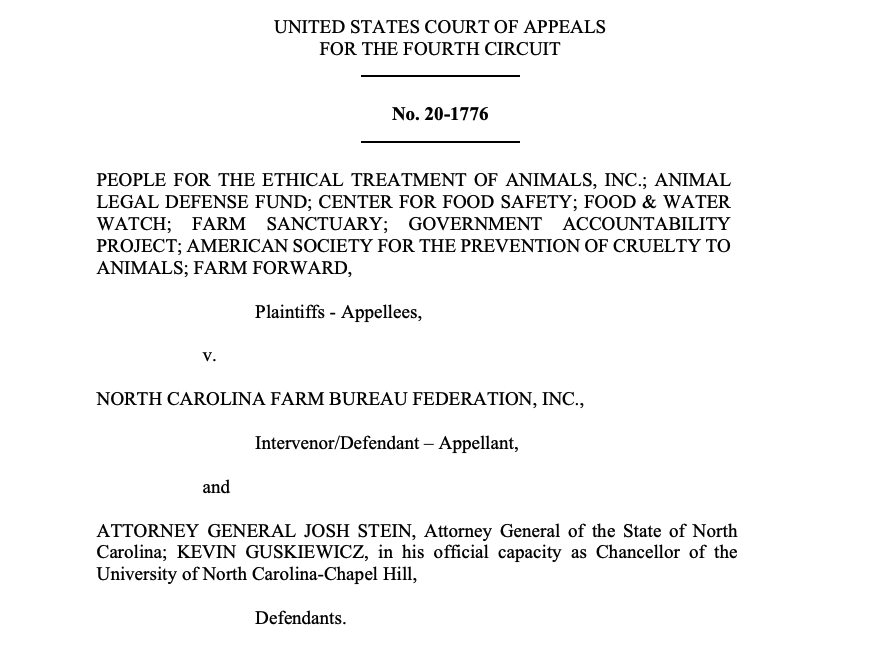Fourth Circuit: Provisions of North Carolina ‘ag-gag’ statute violate First Amendment

A federal appeals court has blocked North Carolina from enforcing provisions of a law that seek to punish newsgathering activities, including undercover investigations at agricultural facilities.
In a ruling issued on Feb. 23, a three-judge panel of the U.S. Court of Appeals for the Fourth Circuit held that, as applied to the newsgathering activities of several animal rights groups, four provisions of the North Carolina Property Protection Act violate the First Amendment.
“[W]hile we agree that an employer could freely choose to deny entry to journalists who seek to secretly record its inner workings, it does not follow that a State can create ‘new categories of unprotected speech’ to punish those journalists,” Senior Judge Henry F. Floyd wrote in the court’s opinion. “The First Amendment limits the government; the government does not limit the First Amendment.”
The North Carolina General Assembly passed the Property Protection Act in 2015. The law allows employers to sue activists and whistleblowers who, among other things, record images or collect data or documents without permission. It is one of many so-called “ag-gag” laws that seeks to block efforts to conduct undercover investigations at agricultural sites — though, unlike others of its kind, the statute covers all businesses, not just agricultural facilities.
People for the Ethical Treatment of Animals and other animal-rights groups filed a lawsuit in 2016 challenging the constitutionality of the North Carolina law. In a friend-of-the-court brief in support of PETA, the Reporters Committee for Freedom of the Press and a coalition of 21 media organizations argued that the law prevents journalists from conducting investigations to inform the public and creates a chilling effect on sources that poses a risk to lawful newsgathering.
The U.S. District Court for the Middle District of North Carolina ruled in 2020 that all four of the provisions challenged by the animal-rights groups violated the First Amendment, holding two of the provisions facially unconstitutional and two of the provisions unconstitutional as applied. However, the court declined to find that the provisions were unconstitutional at all times and in all circumstances. Both parties appealed the court’s decision to the Fourth Circuit.
In a 2-1 ruling, the appeals court agreed that the challenged provisions violate constitutionally protected newsgathering rights, in part because they discriminate against certain types of speech — specifically speech that is damaging to a particular employer. Writing for the majority, Judge Floyd cited the friend-of-the-court brief the Reporters Committee filed in support of PETA’s appeal. The brief stressed the integral role undercover investigations play in informing the public about evidence of dangerous, illegal, or unethical activity at agricultural facilities.
“The right to gather information plays a distinctly acute role in journalism,” the judge wrote. “Firsthand accounts, buttressed by video evidence, enhance accuracy and credibility in reporting and increase transparency and reader trust, allowing the press ‘to tell more complete and powerful stories.’”
The appeals court’s ruling wasn’t a complete win for the animal-rights groups, however. The Fourth Circuit declined to prohibit North Carolina from enforcing potential applications of the law that don’t involve newsgathering.
“Should posting a hidden camera in a CEO’s office — or her home — per se constitute protected expression? How about photographing proprietary documents to tap into trade secrets, with no intent of creating a work of art? Recording private telephone conversations?” Judge Floyd wrote in his opinion. “For our purposes, it suffices to hold only that recording in the employer’s nonpublic areas as part of newsgathering constitutes protected speech.”